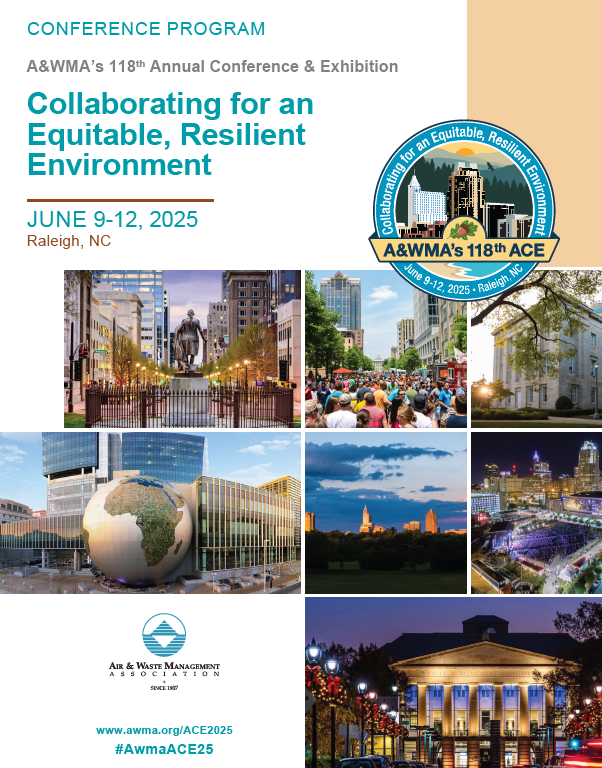ACE 2025
CLIM
Climate Policy, Issues, and Corporate Programs
Assessing the Resilience and Sustainability of Municipal Solid Waste Infrastructure and Management in U.S. Communities
Thursday, June 12, 2025
3:20pm – 3:40pm ET
Location: 306C

Asmita Narode, PhD
Research Environmental Engineer
RTI International, NC- KW
Keith Weitz
RTI International
- DK
Debra Kantner
RTI International
Author(s)
Co-Author(s)
Abstract Description: Projected sea-level rise coupled with other climate impacts such as more frequent and intense storms may increase recurring damage to municipal infrastructure, including municipal solid waste (MSW) management infrastructure. The National Oceanic and Atmospheric Administration (NOAA, 2022) projects a U.S. coastline sea-level rise of 0.82 to 0.98 feet from 2020 to 2050, underscoring the urgency of addressing urban resilience. The growing urgency of climate change, alongside the increasing frequency of natural disasters, has accentuated the need for more resilient and sustainable municipal systems. Waste management stands out as a critical yet often overlooked aspect of urban resilience.
Currently, most insights into climate impacts on waste infrastructure focus on post-disaster characterization, leaving gaps in proactive vulnerability assessments and planning tools. Communities need resources to better anticipate potential impacts, establish resilience plans, and implement sustainable waste management measures.
In this study, case studies of eight communities in the U.S. were conducted to evaluate the resilience and sustainability of MSW management infrastructure to climate impacts. Specifically, our research objectives were to characterize potential climate impacts to the region and assess potential vulnerability of waste infrastructure. In addition, we investigated the roles that resilience and sustainability can play in shaping MSW management infrastructure planning and strategy. The intended outcomes from this study are to 1) support communities in their evaluation and implementation of measures to enhance resilience of waste infrastructure, and 2) analyze current management practices and potential opportunities for improving sustainability outcomes in the future. Communities were engaged and data was collected for vulnerability assessment of flood risk and mapping, sustainability assessment which included economic, environmental, and social analysis, and resilience assessment. For flood risk mapping, waste management infrastructure (transfer stations, recycling, composting, WTE, and landfilling) was assessed to understand low, medium, and high risk for all the communities. Sustainability assessments produced heat maps showing costs and life cycle environmental impacts of moving from low to high recycling rates. Social analyses overlaid environmental justice data, such as air toxic respiratory hazard indices, with minority and low-income population maps.
The results from this study are intended for use in gaining a better understanding of the nature of climate-induced impacts on communities, and approaches for assessing the resilience and sustainability of MSW infrastructure and long-term planning.
Currently, most insights into climate impacts on waste infrastructure focus on post-disaster characterization, leaving gaps in proactive vulnerability assessments and planning tools. Communities need resources to better anticipate potential impacts, establish resilience plans, and implement sustainable waste management measures.
In this study, case studies of eight communities in the U.S. were conducted to evaluate the resilience and sustainability of MSW management infrastructure to climate impacts. Specifically, our research objectives were to characterize potential climate impacts to the region and assess potential vulnerability of waste infrastructure. In addition, we investigated the roles that resilience and sustainability can play in shaping MSW management infrastructure planning and strategy. The intended outcomes from this study are to 1) support communities in their evaluation and implementation of measures to enhance resilience of waste infrastructure, and 2) analyze current management practices and potential opportunities for improving sustainability outcomes in the future. Communities were engaged and data was collected for vulnerability assessment of flood risk and mapping, sustainability assessment which included economic, environmental, and social analysis, and resilience assessment. For flood risk mapping, waste management infrastructure (transfer stations, recycling, composting, WTE, and landfilling) was assessed to understand low, medium, and high risk for all the communities. Sustainability assessments produced heat maps showing costs and life cycle environmental impacts of moving from low to high recycling rates. Social analyses overlaid environmental justice data, such as air toxic respiratory hazard indices, with minority and low-income population maps.
The results from this study are intended for use in gaining a better understanding of the nature of climate-induced impacts on communities, and approaches for assessing the resilience and sustainability of MSW infrastructure and long-term planning.

